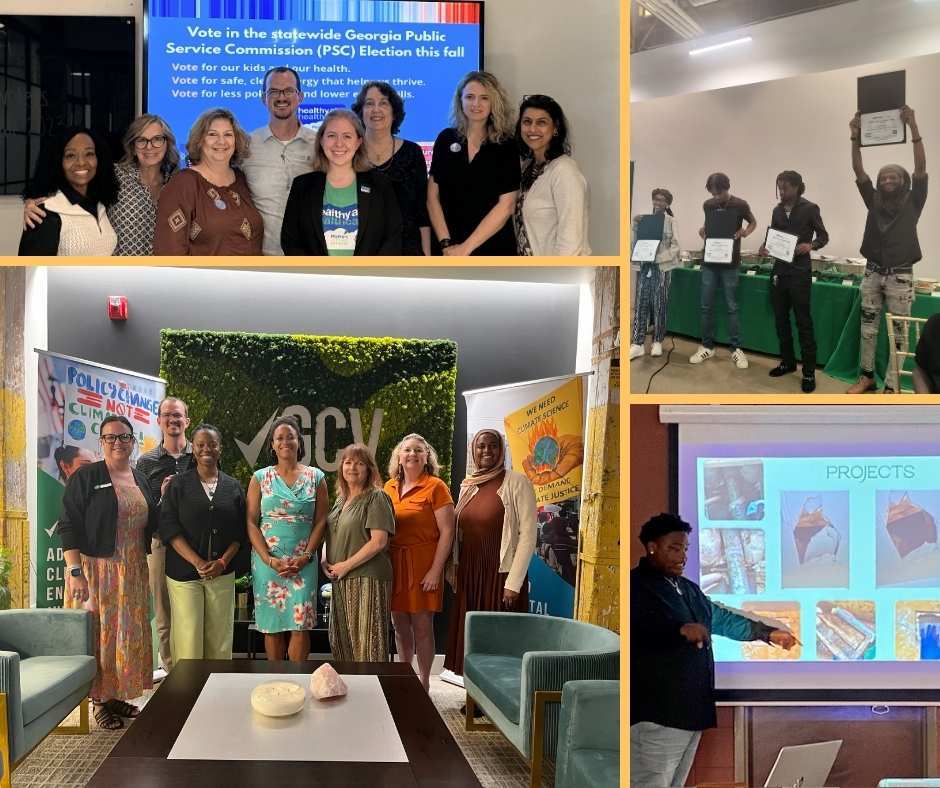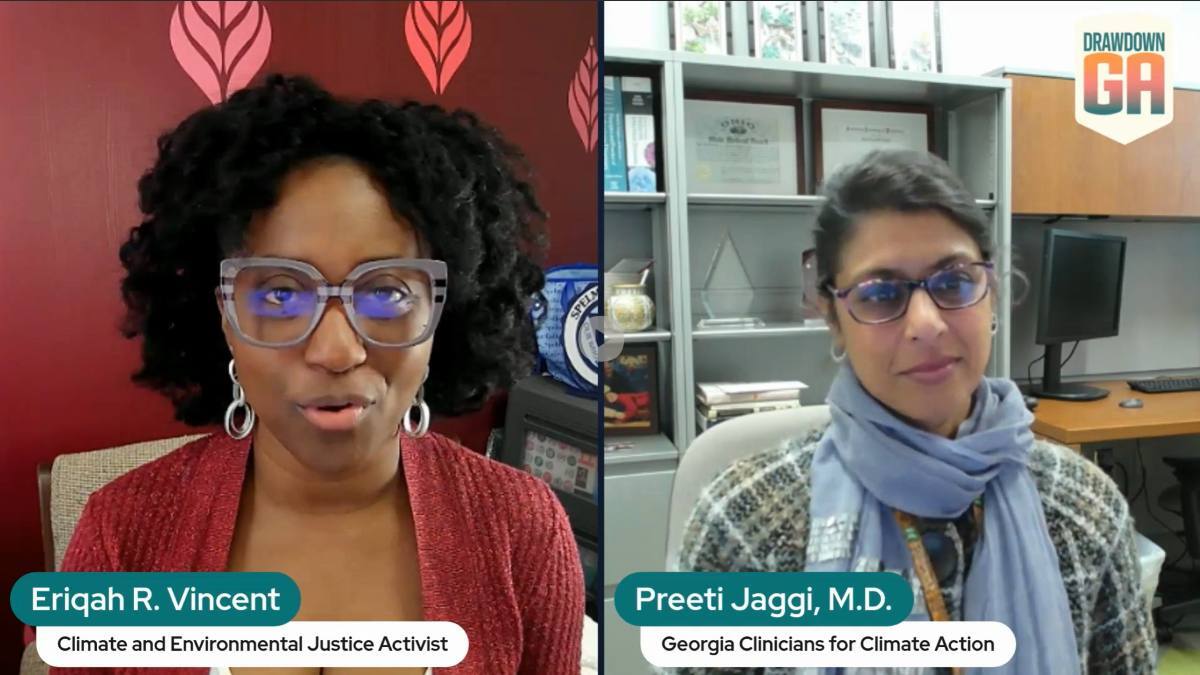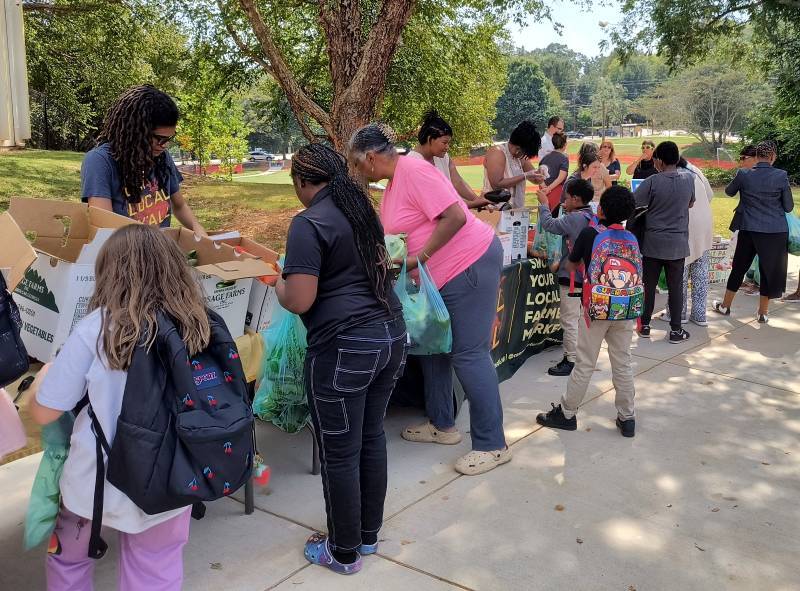When it comes to advancing climate solutions in Georgia, the business community has both the resources and the reach to make a significant impact. That idea is the driving force behind the Drawdown Georgia Business Compact, a collaborative initiative housed at the Ray C. Anderson Center for Sustainable Business at Georgia Tech.
In a recent conversation, longtime climate justice activist Eriqah Vincent sat down with David Eady, the Compact’s organizer and director of industry engagement at Georgia Tech, to talk about how this growing network of companies is working together to scale climate solutions that make sense for Georgia’s economy, environment, and communities.
Watch the video above to hear the full conversation, or keep reading to learn more about the important climate work being done by Drawdown Georgia Business Compact members and to find out how your Georgia business can get involved.
The Drawdown Georgia Business Compact: From Concept to Collaboration
The idea for the Business Compact was born in 2020, just as the first phase of the Drawdown Georgia research identified 20 high-impact, market-ready climate solutions. At the same time, many companies were ramping up their own decarbonization goals—despite a lack of leadership at the federal level.
Seeing an opportunity, David and his team invited businesses to form a collective impact initiative: aligning their individual sustainability goals while working together on shared priorities. The Drawdown Georgia Business Compact launched in October 2021 with a dozen founding members, including Coca-Cola, Delta Air Lines, UPS, Google, Interface, Better Earth, and Goodr. Today, the network has grown to about 70 member companies.
“We wanted the group to represent Georgia’s economy in the fullest sense,” David explained. “That means big multinational corporations, small startups, minority-owned businesses, B Corps, and companies from every region of the state.”
Members commit to sharing their successes and challenges, engaging in collaborative projects, and supporting the Compact’s work through an annual donation scaled to company size.
What Collective Action Looks Like in the Business Compact
The Compact’s initiatives span multiple sectors of Georgia’s economy:
-
Carbon-Free Electricity: Partnering with Georgia Power, MEAG Power, and Georgia EMC to create new pathways for industries to access renewable energy.
-
Renewable Natural Gas: Exploring opportunities to produce biogas from agricultural and forestry byproducts, reducing the carbon intensity of Georgia’s natural gas supply.
-
Sustainable Aviation Fuel: Leveraging Georgia’s agricultural and forestry resources to produce biofuels for commercial jets, creating rural economic opportunities in the process.
-
Carbon Sequestration in Forests: Helping underserved and small-acreage landowners navigate the voluntary carbon market, keeping forests intact and productive.
-
Healthy, Energy-Efficient Homes: Piloting projects to fund critical home repairs alongside energy upgrades, reducing household energy burdens and improving public health.
-
Circularity and Waste Reduction: Identifying ways to increase regional recycling and reuse infrastructure, with an emphasis on plastics.
In each case, the focus is on projects that benefit from collaboration, where companies can achieve more together than they could alone.
Centering Equity in the Drawdown Georgia Business Compact
Equity is not an afterthought for the Compact—it’s built into the work from day one. The group actively recruits women-led, minority-owned, and B Corp-certified businesses and partners with organizations that serve underrepresented communities.
“Intent is so important,” David said. “We want those voices in the room to help us understand the challenges they face and how we can elevate opportunities for them.”
A prime example of a Business Compact member centering equity is Cherry Street Energy’s Shine On training program, which has helped launch minority-owned solar businesses like Be Smart Home Solutions, and initiatives to connect African American and women farmers with renewable natural gas opportunities.
The Power of Partnerships Among Georgia Businesses
One of the Compact’s biggest successes is the community of practice it has built among sustainability leaders. Member companies share ideas, form partnerships, and even create new revenue streams together.
David points to examples like Retaaza and Goodr - two Georgia-based, women-led businesses tackling food waste - who have built connections with larger companies to scale their impact.
“These companies start from a place of seeing a need and figuring out how to meet it while running a successful enterprise,” David said. “They’re purpose-driven, but also profitable.”
Why Business Leaders Should Join the Drawdown Georgia Business Compact
For Georgia business leaders, joining the Compact is an opportunity to:
-
Collaborate with peers on shared challenges and solutions
-
Access Georgia-specific data and research to guide sustainability strategies
-
Contribute to high-impact initiatives that benefit communities and the economy
-
Build valuable partnerships with companies of all sizes and sectors
-
Demonstrate leadership on both environmental and equity goals
As David put it, the Compact attracts “companies that want to be profitable, but also see sustainability and climate action as a strategic imperative—and a moral obligation.”
A Source of Hope for Georgia’s Climate Future
Despite the challenges of decarbonization, David is optimistic about the role of business in Georgia’s climate future.
“Commerce has the resources to make an impact at a scale that few other sectors can,” he said. “It’s inspiring to see companies recognize that potential and bring their resources to bear on these complex challenges.
Learn More About the Drawdown Georgia Business Compact
Is your Georgia business ready to commit to supporting the statewide achievement of net zero emissions by 2050 through individual and collective action?
Learn more about the Drawdown Georgia Business Compact and how your company can get involved at drawdowngabusiness.org.








